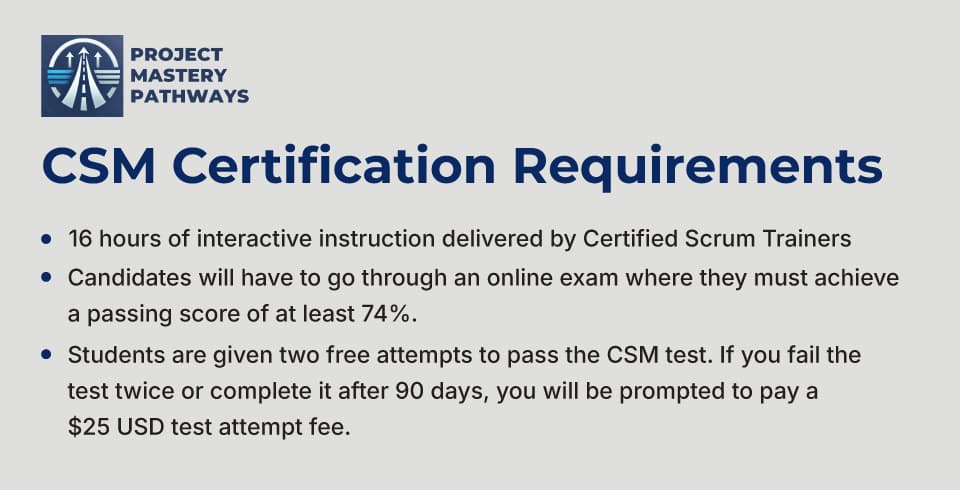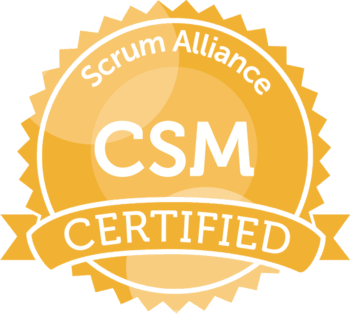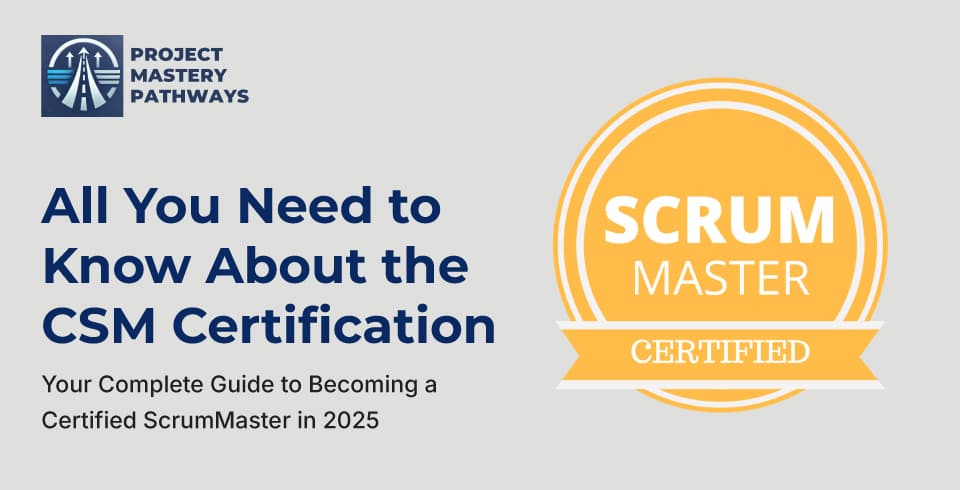Are you struggling to advance your career in agile project management? Feeling overwhelmed by the numerous certification options available and unsure which one will truly boost your professional prospects? Many aspiring project managers face this exact dilemma, especially when trying to break into the rapidly growing world of agile methodologies.
The Certified ScrumMaster (CSM) certification could be your answer. By the end of this comprehensive guide, you’ll understand everything about CSM certification – from costs and requirements to career benefits and renewal processes – empowering you to make an informed decision about this globally recognized credential that could transform your project management career.
Understanding CSM Certification: What It Is and Why It Matters
The Certified ScrumMaster (CSM) certification is a foundational-level credential offered by Scrum Alliance, the first organization to provide Scrum certifications globally. Established in 2001, Scrum Alliance provides certifications with substance that are recognized by employers and recruiters globally.
CSM certification validates your understanding of Scrum framework fundamentals, including the roles, events, and artifacts that drive successful agile projects. As a CSM, you can work on a scrum team as its scrum master or another type of scrum team member, helping teams thrive in an agile environment. The certification demonstrates your ability to facilitate Scrum processes, coach teams, and remove impediments that hinder project progress.
What sets CSM apart from other agile certifications is its practical approach and employer recognition. CSM is the scrum master certification most demanded by employers, making it an excellent entry point for aspiring project managers. The certification focuses on servant leadership principles, teaching you to guide teams rather than manage them traditionally.
For new project managers, CSM provides essential skills in facilitating conversations, managing team dynamics, and coaching individuals in Scrum practices. The certification gives you a credential of demonstrable leadership value that goes beyond traditional project managers, positioning you as someone who can lead modern, collaborative teams effectively.
Understanding types of roles in project management within an organisation helps contextualize where Scrum Masters fit in the broader project management landscape, especially in organizations adopting agile practices.
CSM Certification Requirements and Process: Step-by-Step Guide

Obtaining CSM certification involves a structured process designed to ensure both theoretical understanding and practical readiness. Applicants must attend a CSM course, spread across two days in person or four online, taught by a Certified Scrum Trainer.
Prerequisites and Eligibility: Unlike the advanced-level courses, there are no prerequisites for Certified ScrumMaster, which is an introductory course for anyone who wants to become a competent, skilled scrum master. However, having basic knowledge of project management concepts and agile principles can be beneficial.
Training Requirements: The mandatory training covers 16 hours of interactive instruction delivered by Certified Scrum Trainers (CSTs). These trainers are highly vetted professionals who bring real-world experience to the classroom. The course covers essential topics including Scrum framework, roles and responsibilities, sprint planning, daily standups, sprint reviews, and retrospectives.
Exam Format and Scoring: After completing the training, you’ll receive access to the online exam. The CSM test contains 50 multiple-choice questions based on the CSM Learning Objectives and Scrum Guide. Candidates will have one hour to complete it and must achieve a passing score of at least 74%. This means you need to answer at least 37 questions correctly.
Exam Features: The CSM exam format enables you to skip questions or bookmark them to review them later. The go back option is always present throughout the test. The test is given online and is not proctored, allowing you to take it from any location with internet access.
Retake Policy: Students are also given two free attempts to pass the CSM test. If you fail the test twice or complete it after 90 days, you will be prompted to pay a $25 USD test attempt fee. This generous retake policy reduces pressure and allows adequate preparation time.
For professionals considering different certification paths, understanding which certification is best for project management can help you evaluate CSM against other options like PMP or CAPM.
CSM Certification Cost Breakdown and Investment Analysis

Understanding the financial investment required for CSM certification is crucial for planning your professional development budget. The cost of Certified ScrumMaster courses typically ranges from $500 to $2,495, and this price includes the certification exam.
Training Costs: The price range for the scrum master certification course is $250-$2,495 USD. When you browse the CSM courses, you’ll see that trainers set the prices for the courses they offer. Price varies by region, format, and other market factors. Online courses tend to be more affordable than in-person training, but both formats provide the same certification value.
Additional Fees:
- Exam Retakes: The fee for each additional try is $25 after your first two free attempts
- Renewal Costs: Individuals must recertify every two years with a $100 CSM exam cost for the recertification process
Return on Investment: The financial investment in CSM certification often pays for itself quickly through career advancement and salary increases. Certified Scrum Masters earn an average of $113,381 annually, with advanced certifications boosting salaries by up to $35,000. Glassdoor calculates an average of $128,000 and some roles can command as high as $165,000 for experienced Scrum Masters.
Value Proposition: Certified professionals earn about 24% more than those without certification, and advanced certifications can increase annual salaries by up to $35,000. Additionally, the demand for project management roles is expected to grow by 7% through 2033, indicating strong job security for certified professionals.
When comparing certification investments, consider exploring best project management certifications for beginners to understand how CSM fits within the broader certification landscape.
Renewal Requirements and Maintaining Your CSM Certification
CSM certification isn’t a one-time achievement – it requires ongoing commitment to professional development. Your Scrum Alliance certification is valid for 2 years and must be renewed to maintain its value.
Scrum Education Units (SEUs): CSM is a foundational level certification and requires 20 SEUs to be earned every two years. An SEU is based on a 1:1 ratio of contact hours to points. For example, if you attended a Scrum SEU Course and the duration of the course is 20 hours, you will earn a maximum of 20 SEUs.
SEU Categories: You can earn SEUs in 4 different categories: Learning, Events, Volunteering, and Other. No limits or caps exist for earning SEU credits from a certain category. This flexibility allows you to choose learning methods that suit your schedule and preferences.
Renewal Timeline: Your SEUs must have been earned within thirty (30) months for all certification renewal cycles. If you don’t earn the SEUs and two years have elapsed, you will have six months of grace period to renew your CSM certification.
Renewal Costs: Once you complete 20 SEUs, you can pay the $100 CSM renewal fee and renew your Scrum Master certification. This biennial investment maintains your credential’s validity and demonstrates ongoing professional development.
Alternative Renewal Method: You can renew any other Scrum Alliance certification(s) you have by simply earning another certification. Skip the SEUs with this renewal route since you’ll be learning a ton by taking another class. This path works well for professionals pursuing advanced certifications like A-CSM or CSP-SM.
Member Benefits: Maintaining active CSM certification provides ongoing benefits including access to the world’s largest agile network, exclusive members-only content, the Comparative Agility platform, and discounts on tickets to Scrum Gatherings.
For comprehensive guidance on project management career development, including certification maintenance strategies, check out my educational content on PMPwithRay where I share practical insights from over 15 years of project management experience.
Conclusion: Transform Your Career with CSM Certification
CSM certification represents more than just another credential – it’s your gateway to leading high-performing agile teams and advancing in the rapidly evolving project management landscape. With its global recognition, practical focus, and strong ROI through salary increases and career opportunities, CSM provides an excellent foundation for aspiring project managers.
The investment of $500-$2,495 for training and certification can quickly pay for itself through the 24% average salary increase that certified professionals typically experience. The structured learning process, combined with ongoing renewal requirements, ensures you stay current with agile best practices and maintain your competitive edge.
Whether you’re transitioning into project management, seeking to formalize your agile knowledge, or aiming to lead Scrum teams more effectively, CSM certification offers the credibility and skills needed for success in today’s collaborative work environments.
Ready to take the next step in your project management journey? Follow my educational videos on PMPwithRay for detailed guidance on CSM preparation and agile leadership techniques. For comprehensive training that covers CSM fundamentals and advanced project management skills, explore my specialized courses on Udemy designed specifically for aspiring project managers like you.

